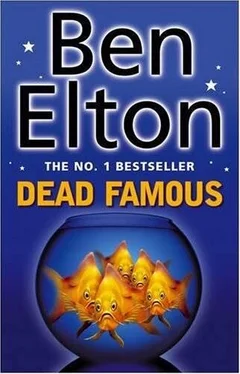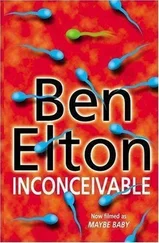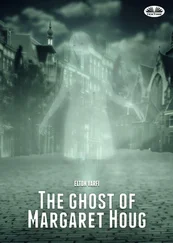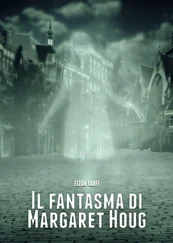And then there was the little matter that they were all quite clearly scared of her.
Of course, besides these negative thoughts they all added that they loved Sally and that she was a top girl.
The other person nominated was Garry, his sick jokes having by this time begun to grate on the inmates.
“I mean, I love him, of course,” said Dervla, “but if he does that screeching noise from Psycho one more time when I go to the toilet…”
“He’s a diamond geezer,” Jazz assured the camera, “but putting ketchup on Moon’s neck while she was having a kip was totally out of order. I mean, he’s brilliant, I love him, but you know what? At the end of the day I’m sick of him.”
When the nominations were announced Sally said nothing. She sat and stared into the distance for about half an hour before retreating to what had once been thought of as the nookie hut.
Garry assured everybody that he was happy to stay or go. “At the end of the day I’ve got a top life out there. I’ve got my little lad, I’m looking forward to going to the pub. I’m happy to crack on and big it up. Long as none of you lot stick a knife in my head before I get a chance to snuggle up on that couch with Chloe.”
Later on that evening Sally returned to the living area, and when she spoke it was to nobody in particular. “You all think I did it, don’t you?” she said. “And you know what? Maybe I did.”
In the monitoring bunker Geraldine did a little dance. “Thank you, Sally, you gorgeous fat dyke, you! Out lines do not get any better than that. Stick it on the end, Bob, and bang to credits, then when the credits are over, play it again… ‘Maybe I did.’ Su-fucking-perb!”
Trisha had gone to see Sally’s mother, a nervous, worried woman, who had been expecting her. “I wondered how long it would take you people to get to me, and after what Sally said on the telly I knew you’d be here this morning.”
“Tell me about Sally,” Trisha said.
“Well, you obviously know that my late husband and I were not her birth parents.”
“Yes, we knew Sally was adopted.”
“Ever since the murder happened I haven’t been able to sleep,” she said, staring down at her teacup. “I know exactly what Sally will be thinking, I know it. She’ll be worrying that people will think that it was her, because of… But you can’t pass mental illness on, can you? Well, it isn’t likely anyway. I’ve asked doctors, they’ve told me.”
“What was wrong with Sally’s mother?”
“Paranoid schizophrenia, but I don’t really know what that means. They seem to use these terms so often these days. Sally found out two years ago last Easter. I don’t think adopted kids should be allowed to find out about where they came from. They never used to be. Adoption meant a completely new beginning, your new family was your family. These days they act as if adoptive parents are just caretakers. They’re not real , they’re not birth !”
“Is that what Sally said to you?” Trisha asked. “That you weren’t a real parent?”
“Well, she loved me, I know that, so she certainly never meant to hurt me. But she used to talk all the time about wanting to find her birth mother, her blood , as she put it. It broke my heart. I’m her real mother, aren’t I? That was the deal.”
“So she found out that her mother had been a mental patient?”
“Well, I told her. I thought better coming from me than from some bloody librarian at the Public Records Office.”
“Is that why Sally was adopted? Because of her mother’s mental instability?”
“You really don’t know, do you? You actually don’t know.” Mrs Copple was surprised.
“We don’t know much at all, Mrs Copple. That’s why we’ve come to you.”
“Oh dear. I don’t want to tell you. If I do you’ll suspect her, but you can’t inherit what that woman had, at least it’s not likely. I’ve talked to doctors. I’ve looked it up on the net.”
“Please, Mrs Copple, I’d much rather talk about this here with you now, at your home.” It was a gentle threat, heavily veiled but effective.
“Her mother was in prison. She killed someone… with a knife. That’s why Sally was put up for adoption.”
“What about the father? Couldn’t he have had her?”
“It was Sally’s father who her mother killed.”
Trisha did everything she could to keep Sally’s sad past a secret. She knew that if it came out Sally would be crucified in the press. Being aware of what leaky places police stations are, she asked to see Coleridge privately to explain her findings.
“There’s no suggestion of abuse or provocation,” Trisha said. “By all accounts Sally’s father was a decent sort of man, if rather weak. Her mother was just pathologically unbalanced, and one night she just flipped.”
“Why did she get prison?” Coleridge asked. “It seems obvious that the woman was ill.”
“Senile judge? Incompetent defence? Who knows, but the prosecution managed to get her tried as a sane defendant. Maybe it was because she was black. This was twenty years ago, remember. Anyway, she got life for murder in the first degree.”
“But appealed, of course.”
“Of course, and won, but sadly not before she’d stabbed two other inmates in Holloway with a sharpened canteen spoon. After that she went to a hospital for the criminally insane, where she still lives. Sally had been born shortly before her father was killed, and I imagine that these days they might have established some link with postnatal depression or whatever, but then they just banged her up and left her. She’s thoroughly institutionalized now, apparently. Sally found out a couple of years ago and went to see her. Shook her up quite a bit.”
“Well, it would do. Does Sally have any mental problems?”
“Yes, depression and plenty of it, right back to puberty. Been on numerous prescriptions and hospitalized once. The adoptive mother thinks it must have all been bound up with working out that she was gay, but I don’t know about that, it certainly never…”
Trisha was about to say that it had never bothered her, that at the age of fourteen when she had finally worked out that she was a lesbian it had in fact been an enormous relief, explaining as it did the abject confusion that she had been experiencing in her relationships with both boys and girls. But she decided to leave the sentence hanging. Now was not the time.
“Whatever the reason, Sally has definitely had problems with depression, and of course ever since she found out about her mother she’s been worrying that she’s going the same way.”
“And what’s the likelihood of that? I mean in medical terms?”
“Well, she’s more likely to flip than, say, you or I, but the chances only become truly significant if both parents were sufferers. Then some doctors say it rises to nearly forty per cent.”
“What on earth were these appalling Peeping Tom people doing letting a serial depressive with a family history of mental illness into their grotesque exercise in the first place?”
“They claim that they didn’t know, sir, and I believe them. Sally didn’t tell them, and they would have had to dig pretty deep to find out, what with medical confidentiality and all that. It’s not as if Sally’s considered dangerous at all. I only found out because her mother told me.”
Coleridge leaned back in his chair and sipped at his little paper cup of water. It had been Hooper who had led the movement to get a water cooler installed in the incident room. Coleridge had resisted it fiercely, believing the whole business to be just another example of everybody these days wanting to look like Americans. However, now that the thing had been installed, he rather liked to be able to sip at clear cold water while he ruminated, and it had helped him to cut down on tea.
Читать дальше












